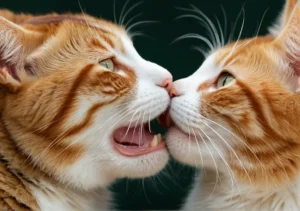Cats are known for their curious and sometimes quirky behavior. One particular mystery that baffles many cat owners is why cats seem to be afraid of pickles. Have you ever noticed your feline friend’s strong reaction to this common household item? Let’s delve into this peculiar phenomenon and uncover the reasons behind it.
The Origin of Cats’ Fear of Pickles
Have you ever wondered why your feline friend reacts so strangely to pickles? Well, the origin of cats’ fear of pickles may actually go back to their ancestors in the wild. Cats are natural predators, and in the wild, they would often encounter snakes, which can be dangerous and venomous.
The shape and texture of a pickle may resemble that of a snake to a cat, triggering their instinctual fear response. This fear could be deeply ingrained in their DNA, causing them to instinctively react with caution or even anxiety when faced with a pickle.
Additionally, the sudden appearance of a pickle, a foreign object that doesn’t fit into a cat’s usual environment, can also startle them. Cats are creatures of habit and routines, so anything out of the ordinary can set off their alarm bells.
Cats’ Natural Instincts at Play
Cats have highly sensitive senses, especially when it comes to smell. They rely heavily on their sense of smell to navigate and understand their surroundings. Pickles have a strong, pungent odor due to the vinegar and spices used in the brine.
This intense smell can overwhelm a cat’s sensitive nose, causing them to react with fear or avoidance. Additionally, the texture of a pickle can feel slimy and unfamiliar to a cat’s delicate paws, further adding to their discomfort.
In the wild, cats would avoid unfamiliar objects or substances to protect themselves from potential harm. This natural instinct to be cautious around unknown items may be another reason why cats are afraid of pickles.
So, the next time your cat jumps at the sight of a pickle, remember that it might just be their innate instincts at play, telling them to steer clear of the mysterious green object on the floor.
The Element of Surprise
Surprise plays a significant role in why cats are afraid of pickles. Picture this: your unsuspecting feline friend is minding their own business when suddenly, out of nowhere, a strange, green object appears next to them. This unexpected encounter can startle even the bravest of cats, triggering their natural instinct to flee or hide. The element of surprise can be particularly intense when a pickle is placed near a cat while they are eating their favorite meal or lounging in their favorite spot. Just like how we might jump at the sound of a sudden loud noise, cats can become scared when faced with a surprising and unfamiliar object like a pickle. So next time you see your cat’s reaction to a pickle, remember, it’s all about that element of surprise!
Sensory Overload: A Possible Explanation
Have you ever stopped to consider how a pickle might overwhelm a cat’s senses? Cats are known for their keen sense of smell and sensitivity to unfamiliar scents. When a pickle is placed near a cat, its strong vinegar aroma could be overpowering, causing discomfort and fear. Moreover, the slimy texture and unusual shape of a pickle could further confuse and unsettle a cat, leading to a sense of sensory overload. Imagine if you were suddenly faced with a bizarre, pungent object that you couldn’t quite understand – you might feel a bit uneasy too! This combination of intense smells, strange textures, and unexpected appearances could be why pickles are a source of fear for many cats. Understanding how cats experience the world through their senses can shed light on why they react the way they do to seemingly harmless objects like pickles.
Additional Insight: Cats are also sensitive to sudden movements, and the way a pickle can quickly roll or bounce could add to their fear response. This unpredictability can heighten their sense of unease and trigger their instinct to escape the perceived threat.
Cultural Influences on Cats’ Behavior
Cultural factors and environmental cues can significantly impact a cat’s reaction to pickles. For instance, if a cat has never been exposed to pickles before, the unfamiliar sight, smell, or sound of a pickle could trigger fear or anxiety. Cats are creatures of habit and tend to be wary of new or unfamiliar objects in their environment.
Additionally, the sharp smell of vinegar that emanates from pickles might be unpleasant or overwhelming for cats with sensitive noses. In some cases, a loud crunching sound when a pickle is bitten into could startle a cat and lead to a fear response. These sensory stimuli associated with pickles can contribute to a cat’s aversion to them.
It’s essential to remember that cats have different preferences and sensitivities, just like humans do. While some cats may be curious about pickles or indifferent to them, others may perceive them as a potential threat due to their unique sensory experiences. Understanding these cultural influences can help pet owners better navigate their cats’ reactions to unfamiliar objects like pickles.
Myth Busting: Debunking Common Misconceptions
Let’s address a common misconception surrounding cats’ fear of pickles. Despite popular belief, cats are not inherently afraid of pickles specifically. Cats’ reactions to pickles are likely more rooted in their natural instincts and individual sensitivities rather than a universal fear of this particular vegetable.
Cats have a keen sense of smell and may be sensitive to strong odors like vinegar, which is commonly used in pickle brine. The sharp sound of a pickle crunching could also trigger a cat’s prey instincts, causing them to perceive the pickle as a potential threat. These natural reactions can lead to fear or avoidance behaviors when confronted with a pickle.
Ultimately, cats’ fear of pickles is not a widespread phenomenon dictated by a universal fear of the vegetable itself. Instead, it is more likely a combination of individual sensitivities, past experiences, and sensory stimuli that shape a cat’s reaction to pickles. Understanding this can help dispel myths surrounding cats’ fear of pickles and encourage a more nuanced approach to interpreting their behavior.
Overcoming Cats’ Fear of Pickles
If your feline friend seems to have an irrational fear of pickles, fear not! There are ways to help them overcome this puzzling phobia. One effective strategy is desensitization – gradually exposing your cat to pickles in a controlled, positive environment. Start by placing a pickle at a safe distance from your cat during mealtime or playtime, allowing them to observe from afar. Slowly move the pickle closer over time, rewarding your cat with treats or toys to create positive associations.
Another tip is to engage your cat in interactive play while the pickle is nearby. By redirecting their focus to a fun activity, they may start to feel less threatened by the presence of the pickle. Additionally, offering treats or catnip near the pickle can help your cat associate it with positive experiences.
Remember, patience is key when helping your cat conquer their pickle phobia. Take small steps, provide reassurance, and never force your cat to interact with the pickle if they seem uncomfortable. With time and gentle encouragement, your cat may just learn to live harmoniously with pickles.
Fun Facts About Cats and Pickles
Did you know that cats’ aversion to pickles may be linked to their sensitive sense of smell? Cats have a keen sense of smell, with certain scents triggering fear or discomfort. The strong aroma of pickles, especially if they are pickled with ingredients like garlic or vinegar, can be overwhelming for cats, leading to their fear response.
Here are some fun and quirky facts about cats and pickles that might surprise you:
- Cats’ fear of pickles is often categorized as a type of neophobia, which is the fear of new or unfamiliar things.
- Some cats may mistake the crunching sound of a pickle for a hiss, which can contribute to their fear.
- The shape and texture of pickles, resembling a snake or other predator, may trigger a primal instinct in cats, causing them to feel threatened.
Next time you catch your cat giving a pickle the cold shoulder, remember these fascinating tidbits about their peculiar phobia. Who knew that such a small green vegetable could stir up such big emotions in our feline companions?
Alex, a passionate animal lover, has experience in training and understanding animal behavior. As a proud pet parent to two dogs and three cats, he founded AnimalReport.net to share insights from animal experts and expand his knowledge of the animal kingdom.




